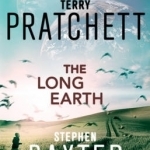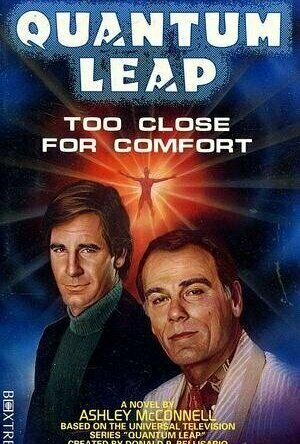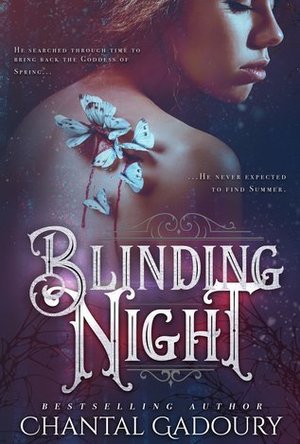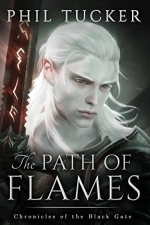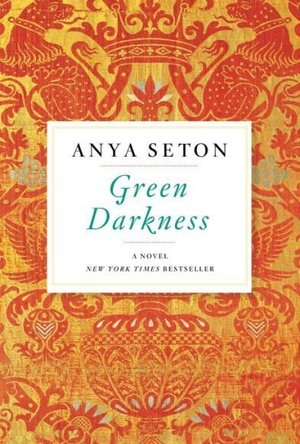Search

Storms of Malhado
Book
Galveston Island, Texas, September 2008 As even die-hard islanders evacuate, Katie and her...
Texas Galveston Reincarnation past lives romance
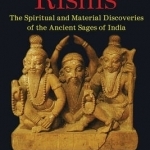
The Science of the Rishis: The Spiritual and Material Discoveries of the Ancient Sages of India
Vanamali and Bhoomananda Tirtha
Book
Called "the scientists of Hinduism," the rishis of ancient India were the scribes of the Vedas. They...
Phil Leader (619 KP) rated The Long Earth in Books
Nov 20, 2019
Step Day. A day that changed the world. A day when the designs for a strange device went viral. Relatively simple to make with a few electronic components and a potato, this small device allowed most people to move sideways into a parallel dimension... and from there they could keep going exploring multiple copies of Earth, each different and all of them untouched and available for colonisation by the population of the overcrowded, overdeveloped and worn out original.
Joshua Valiente is an orphan who discovers that he doesn't actually need a box to move dimensions - to Step - he is a natural, like a few others before him that have already discovered what becomes known as the Long Earth and have kept it to themselves. Big business isn't slow to take advantage, particularly the huge, powerful and shadowy Black Corporation, whose distributed super computer Lobsang claims to be the reincarnation of a Tibetan mechanic. Together Joshua and Lobsang will discover a few of the secrets of the Long Earth, as well as witnessing the worst it brings out in humanity.
With this central idea, Pratchett and Baxter tell the tales of various people affected by the events of Step Day in very different ways. As with the rest of humanity, the narrative is restless, keen to both rush out and see how far along the Long Earth it can travel and to watch how it turns the Earth we all know on its head. This is a book of wonders, a little like Gulliver's Travels in finding interesting variations to explore.
Those expecting the usual slew of jokes, gags, footnotes and humorous characters that typify his Discworld novels will be disappointed. There are light touches to the situations and characters that betray his hand but this is straight science fiction by two great authors who between them manage to convey the huge scale of thousands - millions - of Earths while still being able to tell the story from a human perspective.
Joshua Valiente is an orphan who discovers that he doesn't actually need a box to move dimensions - to Step - he is a natural, like a few others before him that have already discovered what becomes known as the Long Earth and have kept it to themselves. Big business isn't slow to take advantage, particularly the huge, powerful and shadowy Black Corporation, whose distributed super computer Lobsang claims to be the reincarnation of a Tibetan mechanic. Together Joshua and Lobsang will discover a few of the secrets of the Long Earth, as well as witnessing the worst it brings out in humanity.
With this central idea, Pratchett and Baxter tell the tales of various people affected by the events of Step Day in very different ways. As with the rest of humanity, the narrative is restless, keen to both rush out and see how far along the Long Earth it can travel and to watch how it turns the Earth we all know on its head. This is a book of wonders, a little like Gulliver's Travels in finding interesting variations to explore.
Those expecting the usual slew of jokes, gags, footnotes and humorous characters that typify his Discworld novels will be disappointed. There are light touches to the situations and characters that betray his hand but this is straight science fiction by two great authors who between them manage to convey the huge scale of thousands - millions - of Earths while still being able to tell the story from a human perspective.
Sean Astin recommended Patton (1970) in Movies (curated)
David McK (3705 KP) rated Quantum Leap: Too Close for Comfort in Books
Sep 22, 2024 (Updated Sep 22, 2024)
"Theorising that one could time travel within his own lifetime, Doctor Sam Beckett stepped into the Quantum Leap accelerator and vanished... He woke to find himself trapped in the past, facing mirror images that were not his own, and driven by an unknown force to change history for the better. His only guide on this journey is Al, an observer from his own time, who appears in the form of a hologram that only Sam can see and hear. And so Doctor Beckett finds himself leaping from life to life, striving to put right what once went wrong, and hoping each time that his next leap will be the leap home…”
That's the intro from the original, 1990s, show (as opposed to the more modern 2020 reincarnation).
Why am I posting the above?
Because this novel itself is from the 90s, long before Dr Raymond Song or any of the newer bunch, and so focuses on the original Leaper Sam, and his hologrammatic observer Al.
It was also obviously written whilst the show was still on air (or, at the very least, not long after it ended), and very much could have been a episode of that original show, which was far more episodic in nature than the newer version.
Here, Sam finds himself in the body of a college graduate in what-I-believe-to-be the early 1990s, leasing a room from a college professor who is very much into the whole Men movement of the era, so much so that said professor does not even realize when his family life is falling down around him.
Being the early 1990s, this is far too close to the timeline from which Sam leaps (1999), with Al Calvacci also involved here both as Sam's hologram, and as an actual person who Sam encounters as a member of Dr Wales encounter group. Hence the title 'Too Close for Comfort', which can be construed in multiple different ways!
That's the intro from the original, 1990s, show (as opposed to the more modern 2020 reincarnation).
Why am I posting the above?
Because this novel itself is from the 90s, long before Dr Raymond Song or any of the newer bunch, and so focuses on the original Leaper Sam, and his hologrammatic observer Al.
It was also obviously written whilst the show was still on air (or, at the very least, not long after it ended), and very much could have been a episode of that original show, which was far more episodic in nature than the newer version.
Here, Sam finds himself in the body of a college graduate in what-I-believe-to-be the early 1990s, leasing a room from a college professor who is very much into the whole Men movement of the era, so much so that said professor does not even realize when his family life is falling down around him.
Being the early 1990s, this is far too close to the timeline from which Sam leaps (1999), with Al Calvacci also involved here both as Sam's hologram, and as an actual person who Sam encounters as a member of Dr Wales encounter group. Hence the title 'Too Close for Comfort', which can be construed in multiple different ways!
Becs (244 KP) rated Blinding Night in Books
May 17, 2019
Rushed at parts and slow at others, but the story was there
My rating: ☆☆☆.5
I received the audiobook version of Blinding Night to read and review for my honest opinion.
I was very excited to read this as it was a retelling of my favorite Greek God and Goddess. I did enjoy it, but there were things that I was kind of so/so on. We'll get to that in a bit though.
Blinding Night follows Summer as she heads to Greece with her family for an expedition over summer vacation. Summer is not at all too happy about spending the entire summer months in a different country with her family while her friends were out having fun. But when Summer arrives in Greece, things take a twist of a turn.
She begins having visions and dreams of a shadowed figure and pomegranate seeds. Then the unthinkable happens, a tragic car accident. This is about the time when Summer meets Darce, a disguise of Hades. Darce then seduces Summer down into the Underworld because he believes she is the reincarnation of his long lost love Persephone. But they can't say anything because than Demeter who has been disguising herself as Summer's mother, will try to take her back. Which is not what we need, because that could lead to some very bad endings.
Characters:
Summer - the main character, a reincarnation of Persephone. Whines and complains a ton.
Darce - a disguise that Hades uses for when he's in the Human world. Supposed to be very dominant, brooding, and in charge, yet is not. Don't get me wrong, he was witty and seductive - which is honestly something I rather enjoy in the main man.
Morpheus - a very laid back character that I at first thought was more of a side character but he plays a very important role throughout the story.
Arae - sassy, snarky, the exact replica of a mean girl. Her snarky comments to the other gods had me cracking up!
Reasons why I rated it 3.5 stars:
1. The plot:
There were a lot of plot holes, at least that's what it felt like. Summer would do things that didn't make any sense and it just left me really confused over the entirety of the story. Some parts were rushed, while others were slow. It wasn't balanced as well as I'd hoped it was. When I imagined a modern retelling of Hades and Persephone, I figured it would have a bit of the dramatic, dark, and Gothic aura around the Underworld and Hades himself as is found in other retellings. Instead, I was left with sunshine and buttercups and just a small disappointed flare that raced through my body. Also, the part I enjoyed the most was the ending. That's when things actually started to get interesting. Chantal does not disappoint on cliffhangers, cause that was a surprise of a cliffhanger.
2. My enjoyment:
I really enjoyed the story as a whole and would reread again at a later date, but I just wish it was more fleshed out.
3. Character and story development:
There was hardly any character development and that made the story a bit dry. There was some story development but not as much that was needed. I found some parts to be rather boring because it lacked the spark of background that could have made this story so much better.
4. Grammar and spelling:
Since I listened to the audiobook version of the story, I can't say much for the grammar and spelling. I'm going to assume it's good and the way Chantal writes had me enthralled with the story.
5. The overall story:
The story wasn't at all what I imagined how the story was going to go. It was a good and very light story, but it lacked the intensity that comes when you read retellings of Greek gods and goddess'.
"Stories tend to get messed up all the time. It's like a classic game of telephone. Somewhere along the way, the truth is lost and the story becomes something entirely different."
I received the audiobook version of Blinding Night to read and review for my honest opinion.
I was very excited to read this as it was a retelling of my favorite Greek God and Goddess. I did enjoy it, but there were things that I was kind of so/so on. We'll get to that in a bit though.
Blinding Night follows Summer as she heads to Greece with her family for an expedition over summer vacation. Summer is not at all too happy about spending the entire summer months in a different country with her family while her friends were out having fun. But when Summer arrives in Greece, things take a twist of a turn.
She begins having visions and dreams of a shadowed figure and pomegranate seeds. Then the unthinkable happens, a tragic car accident. This is about the time when Summer meets Darce, a disguise of Hades. Darce then seduces Summer down into the Underworld because he believes she is the reincarnation of his long lost love Persephone. But they can't say anything because than Demeter who has been disguising herself as Summer's mother, will try to take her back. Which is not what we need, because that could lead to some very bad endings.
Characters:
Summer - the main character, a reincarnation of Persephone. Whines and complains a ton.
Darce - a disguise that Hades uses for when he's in the Human world. Supposed to be very dominant, brooding, and in charge, yet is not. Don't get me wrong, he was witty and seductive - which is honestly something I rather enjoy in the main man.
Morpheus - a very laid back character that I at first thought was more of a side character but he plays a very important role throughout the story.
Arae - sassy, snarky, the exact replica of a mean girl. Her snarky comments to the other gods had me cracking up!
Reasons why I rated it 3.5 stars:
1. The plot:
There were a lot of plot holes, at least that's what it felt like. Summer would do things that didn't make any sense and it just left me really confused over the entirety of the story. Some parts were rushed, while others were slow. It wasn't balanced as well as I'd hoped it was. When I imagined a modern retelling of Hades and Persephone, I figured it would have a bit of the dramatic, dark, and Gothic aura around the Underworld and Hades himself as is found in other retellings. Instead, I was left with sunshine and buttercups and just a small disappointed flare that raced through my body. Also, the part I enjoyed the most was the ending. That's when things actually started to get interesting. Chantal does not disappoint on cliffhangers, cause that was a surprise of a cliffhanger.
2. My enjoyment:
I really enjoyed the story as a whole and would reread again at a later date, but I just wish it was more fleshed out.
3. Character and story development:
There was hardly any character development and that made the story a bit dry. There was some story development but not as much that was needed. I found some parts to be rather boring because it lacked the spark of background that could have made this story so much better.
4. Grammar and spelling:
Since I listened to the audiobook version of the story, I can't say much for the grammar and spelling. I'm going to assume it's good and the way Chantal writes had me enthralled with the story.
5. The overall story:
The story wasn't at all what I imagined how the story was going to go. It was a good and very light story, but it lacked the intensity that comes when you read retellings of Greek gods and goddess'.
"Stories tend to get messed up all the time. It's like a classic game of telephone. Somewhere along the way, the truth is lost and the story becomes something entirely different."
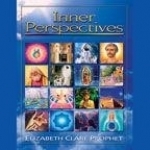
Inner Perspectives: Guideposts for the Spiritual Journey
Podcast
Elizabeth Clare Prophet, modern mystic and pioneer in New Age spirituality, answers more than 300...
Ross (3284 KP) rated The Path of Flames in Books
Oct 24, 2017
This book has popped up a number of times as I have strolled through the fantasy section of Amazon's kindle store in the past. However, I was never really taken with the cover (which sadly I do base my TBR list on, in part) as I'm not much of one for elves. However, with the invitation to sample Kindle Unlimited for 60 days I thought I'd try and maximise my trial period and blast through this (now completed) series.
The first in the 5 book series (unless you count Escape from Bythos, a short opener) begins with Asho (the white haired character on the cover, not an elf after all but a Bythian human, at war alongside his lord and the army of "the good" against the armies of "the bad". We gradually start to see the world revealed at a gentle pace and each of the races are at different stages of their ascension to heaven, each step depending on how they lived that life (kind of like a tiered Buddhist reincarnation with eventually getting to heaven after a number of good lives). The Bythians are the lowest of the low and Asho is very lucky to be allowed to squire the Ennoian (read annoyin') Lord Kyferin.
From the result of that battle, further PoV characters are introduced: Ishkra and Kethe (Lord Kyferin's widow and daughter respectively), Audsley the magister and former knight Ser Tiron, as well as the orc-esque kragh Tarkon. All but Tarkon's narratives blend together to give an overall storyline from different perspectives.
The somewhat familiar castle setting is quickly thrown out the window as Lord Kyferin's brother takes over the castle and banishes his widow through a lunar gate (a mystic portal that only opens once a month used to travel great distances) along with her loyal followers into a ruined inhospitable wasteland with demons wandering the moors.
The characters are well defined and develop well through their trials and tribulations. While the plot is somewhat reactionary (there isn't really one main quest set up early on, rather events unfold and the plot is driven from there) this doesn't feel like it evolved that way, everything slots together well.
I have really enjoyed this first episode in the world of the black gate and have carried on with the follow-up, The Black Shriving.
The first in the 5 book series (unless you count Escape from Bythos, a short opener) begins with Asho (the white haired character on the cover, not an elf after all but a Bythian human, at war alongside his lord and the army of "the good" against the armies of "the bad". We gradually start to see the world revealed at a gentle pace and each of the races are at different stages of their ascension to heaven, each step depending on how they lived that life (kind of like a tiered Buddhist reincarnation with eventually getting to heaven after a number of good lives). The Bythians are the lowest of the low and Asho is very lucky to be allowed to squire the Ennoian (read annoyin') Lord Kyferin.
From the result of that battle, further PoV characters are introduced: Ishkra and Kethe (Lord Kyferin's widow and daughter respectively), Audsley the magister and former knight Ser Tiron, as well as the orc-esque kragh Tarkon. All but Tarkon's narratives blend together to give an overall storyline from different perspectives.
The somewhat familiar castle setting is quickly thrown out the window as Lord Kyferin's brother takes over the castle and banishes his widow through a lunar gate (a mystic portal that only opens once a month used to travel great distances) along with her loyal followers into a ruined inhospitable wasteland with demons wandering the moors.
The characters are well defined and develop well through their trials and tribulations. While the plot is somewhat reactionary (there isn't really one main quest set up early on, rather events unfold and the plot is driven from there) this doesn't feel like it evolved that way, everything slots together well.
I have really enjoyed this first episode in the world of the black gate and have carried on with the follow-up, The Black Shriving.
Acanthea Grimscythe (300 KP) rated Green Darkness in Books
May 16, 2018
Having picked <i>Green Darkness</i> up from the local library bookstore sale for only a quarter, I truly had no idea what I was getting myself into. Historical fiction, in any form, is not a genre that I've spent much time with, and coupling that with paranormal romance? Well, we can safely say that I was in for a ride.
<i>Green Darkness</i> shares the harrowing tale of forbidden love in mid-1500s England between an unfortunate peasant girl and a Benedictine monk, betwixt the reigns of King Edward VI, Queen Mary I, and Queen Elizabeth - a time when Catholicism and Protestantism (depending on the ruler) were met with persecution. It doesn't begin in that era, however; rather, the story starts in the 1960s, when Celia and her newly wedded husband, Richard Marsdon, arrive at his family's ancestral estate in Sussex. A baffling illness befalls the Marsdons, leaving the unorthodox physician, Doctor Akananda, to unravel the mysterious past that haunts the pair from hundreds of years before.
The twisting tale that unravels of that love affair is only a small part of what I enjoyed about this book, as romance is not typically my cup of tea. What truly enticed me was [a:Anya Seton|18930|Anya Seton|https://d.gr-assets.com/authors/1224813438p2/18930.jpg]'s faithfulness not only to history, but to location, legend, and use of historical figures. Cowdray House and Ightham Mote are real places, and an unfounded rumor regarding the Mote suggests that a female skeleton was found within its walls - which Seton used as a basis for her story. Through Seton, I discovered an unknown love for Tudor England, and undoubtedly I will read more books set in that time period.
Despite my praise for the book, I was unable to give it a five star rating because of its conclusion: it was as if Seton ran out of fuel. The idea of reincarnation takes a more ridiculous turn when Doctor Akananda hints at more pasts that conveniently interlock the same people. As if that were not enough of an affront, the resolution itself fell flat. With the Marsdon family tragedy conveniently wrapped up, Celia and Stephen seem aloof and their interaction felt a bit too forced. It is for this reason that I gave the book four stars.
<i>Green Darkness</i> shares the harrowing tale of forbidden love in mid-1500s England between an unfortunate peasant girl and a Benedictine monk, betwixt the reigns of King Edward VI, Queen Mary I, and Queen Elizabeth - a time when Catholicism and Protestantism (depending on the ruler) were met with persecution. It doesn't begin in that era, however; rather, the story starts in the 1960s, when Celia and her newly wedded husband, Richard Marsdon, arrive at his family's ancestral estate in Sussex. A baffling illness befalls the Marsdons, leaving the unorthodox physician, Doctor Akananda, to unravel the mysterious past that haunts the pair from hundreds of years before.
The twisting tale that unravels of that love affair is only a small part of what I enjoyed about this book, as romance is not typically my cup of tea. What truly enticed me was [a:Anya Seton|18930|Anya Seton|https://d.gr-assets.com/authors/1224813438p2/18930.jpg]'s faithfulness not only to history, but to location, legend, and use of historical figures. Cowdray House and Ightham Mote are real places, and an unfounded rumor regarding the Mote suggests that a female skeleton was found within its walls - which Seton used as a basis for her story. Through Seton, I discovered an unknown love for Tudor England, and undoubtedly I will read more books set in that time period.
Despite my praise for the book, I was unable to give it a five star rating because of its conclusion: it was as if Seton ran out of fuel. The idea of reincarnation takes a more ridiculous turn when Doctor Akananda hints at more pasts that conveniently interlock the same people. As if that were not enough of an affront, the resolution itself fell flat. With the Marsdon family tragedy conveniently wrapped up, Celia and Stephen seem aloof and their interaction felt a bit too forced. It is for this reason that I gave the book four stars.
Acanthea Grimscythe (300 KP) rated Eat the Night in Books
May 16, 2018
If you’re looking for a good ol’, classic horror tale in the flavor of <i>Evil Dead</i> or <i>Army of Darkness</i>, Tim Waggoner’s <i>Eat the Night</i> is a must-read. It’s fast paced and filled with the sort of material horror fans like me grew up with. Death cult? Check. Mass suicide? Check. Possession? Check. Vivid, gore-filled scenes? Hideous monsters from another dimension? Reincarnation? Check, check, and check. I can’t even begin to describe how hungrily I devoured this book, and though it has its ridiculous moments, I’ll definitely be looking out for more from this author!
Thirty years ago, retired rockstar Mark Maegarr and his devout followers, in true Jonestown fashion, committed suicide in tropic Suriname. It was Maegarr’s belief that this ritual would hasten the approach of Entropy, or the total dissolution of the world as we know it. Unfortunately for Maegarr, something went wrong and he spends the next several decades reaching from beyond the grave to finish what he started.
Joan Lantz and her husband, Jon, are first time home-owners. Burdened with a troubled past, Joan is glad to finally have a home of her own. After waking from a horrific nightmare detailing the grisly end that befell Mark Maegarr and his cult, she discovers a hidden basement in her home, which had not been on the house’s plans and was previously unknown to the home’s last owners, who were friends of hers.
Kevin Benecke works for Maintenance, a secretive company that is reminiscent of Men in Black. Aware that they cannot save the world from its fate, their goal is to slow the coming of the end down from the sidelines. He’s an unfortunate sort of fellow and things don’t happen to go the way they ought to in his line of work, but he has his own boyish charm.
Together, these three characters weave a story that is brimming with horrific scenes and action. The plot is fairly solid as well, and Waggoner doesn’t hold back when it comes to the laws of the world he has created to coexist alongside the one we know so well. Maegarr’s cult is expertly crafted, with a belief so plausible it could be defined as chilling.
<i>Eat the Night</i> is easily one of my favorite reads so far this year and is perfect for those looking for a good Halloween read. I would like to extend a special thanks to NetGalley, DarkFuse, and Tim Waggoner for providing me with an advanced copy for the purpose of an honest, unbiased review.
Thirty years ago, retired rockstar Mark Maegarr and his devout followers, in true Jonestown fashion, committed suicide in tropic Suriname. It was Maegarr’s belief that this ritual would hasten the approach of Entropy, or the total dissolution of the world as we know it. Unfortunately for Maegarr, something went wrong and he spends the next several decades reaching from beyond the grave to finish what he started.
Joan Lantz and her husband, Jon, are first time home-owners. Burdened with a troubled past, Joan is glad to finally have a home of her own. After waking from a horrific nightmare detailing the grisly end that befell Mark Maegarr and his cult, she discovers a hidden basement in her home, which had not been on the house’s plans and was previously unknown to the home’s last owners, who were friends of hers.
Kevin Benecke works for Maintenance, a secretive company that is reminiscent of Men in Black. Aware that they cannot save the world from its fate, their goal is to slow the coming of the end down from the sidelines. He’s an unfortunate sort of fellow and things don’t happen to go the way they ought to in his line of work, but he has his own boyish charm.
Together, these three characters weave a story that is brimming with horrific scenes and action. The plot is fairly solid as well, and Waggoner doesn’t hold back when it comes to the laws of the world he has created to coexist alongside the one we know so well. Maegarr’s cult is expertly crafted, with a belief so plausible it could be defined as chilling.
<i>Eat the Night</i> is easily one of my favorite reads so far this year and is perfect for those looking for a good Halloween read. I would like to extend a special thanks to NetGalley, DarkFuse, and Tim Waggoner for providing me with an advanced copy for the purpose of an honest, unbiased review.
